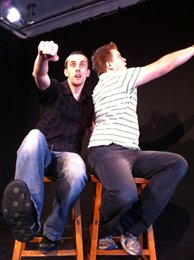There are any number of ‘road trip’ touchstones to be consulted when faced with a road trip play, and in this case Thelma and Louise seems most relevant, despite the gender of the characters and the reasons for the journey. In Skullduggery, we’ve got two inner city lads hopping into the car to take their particular brand of mayhem and casual drug use down the country. There seems to be nothing more on the agenda than drinking, shagging, and petty larcenies; and yet, there’s also a bid for freedom involved in this escapade, one that manifests itself with tragic results.
Rollo (O’Shea) has got a mysterious mission to complete on the other side of Ireland, and nabs his friend Zoo (Currivan) to ride shotgun. Zoo is our primary narrator, and both actors play all the roles, aided by little more than a few lighting cues and two wooden stools. It’s a mode of theatrical devising that audiences are well-used to at this stage, and while the lads don’t push the envelope of the form, neither do they do it an injustice. They are both well able for the myriad characters demanded by O’Shea’s self-penned text, and the writing and performing are by turns funny and poignant.
 The poignancy is almost all Zoo’s, as the trip brings out the worst of his friendship with Rollo, who is the Louise to Zoo’s Thelma. Zoo is never allowed, literally or figuratively, to sit in the driver’s seat. He is basically bullied by Rollo throughout, and Zoo spends much of the journey trying to get shot of Rollo. It quickly becomes apparent that all Zoo wants out of life, really, is to find a nice wee bird and fall in love. He does, in fact, do so - fall in love, that is, although the bird isn’t all that nice. Little annoyances and treacheries between the two lads add up, mile by mile, until Rollo’s pinching of that nice wee bird is one step too far, and the rage that Zoo has been harbouring from the beginning of the excursion explodes into a physical fight between the two friends. With one punch too well-landed, one shove too strong, Zoo is faced with the fact that he’s just killed his buddy.
The poignancy is almost all Zoo’s, as the trip brings out the worst of his friendship with Rollo, who is the Louise to Zoo’s Thelma. Zoo is never allowed, literally or figuratively, to sit in the driver’s seat. He is basically bullied by Rollo throughout, and Zoo spends much of the journey trying to get shot of Rollo. It quickly becomes apparent that all Zoo wants out of life, really, is to find a nice wee bird and fall in love. He does, in fact, do so - fall in love, that is, although the bird isn’t all that nice. Little annoyances and treacheries between the two lads add up, mile by mile, until Rollo’s pinching of that nice wee bird is one step too far, and the rage that Zoo has been harbouring from the beginning of the excursion explodes into a physical fight between the two friends. With one punch too well-landed, one shove too strong, Zoo is faced with the fact that he’s just killed his buddy.
The structure of the play deftly reflects the tempo of a long-distance car journey itself: the initial excitement of embarking is swiftly followed on by the confusion of decisions to be made, and the pacing of the play eventually drifts into the twilight slog of the final third of the trip - with the achievement of the goal almost bewildering. How did we get here? What do we do know? Why did we head off in the first place? As the play gets somewhat lost in its own conceit, we begin to wander about ourselves. When the lads get sidetracked somewhere short of the goal, it seems as if they, and the play, have lost all sense of direction.
When it does reach its narrative goal, the denouement is fast and violent and slightly inexplicable. Things happen because we are told they did, rather than being shown to us, and it robs the piece of all the sense it had been making up until then. That Zoo is betrayed by Rollo is no real surprise, but the specific events that encompassed this betrayal, and the means by which Zoo discovered it, seem extremely forced.
However, it is fascinating to ponder the gulf between a story about women who are on the run from violence, and men who take it on the road. Thelma and Louise kill the man who raped the former, and as bossy as is the latter, the two friends ultimately choose the final, great escape when the world and its laws decide that justice is not the same as the law. Rollo and Zoo, by contrast, perfectly exemplify the kind of male friendships that have little to do with liking, and more to do with power. The entire journey is a negotiation to be in that driving seat, and Zoo effectively takes the wheel at the end, but most certainly at the expense of his entire life. Skullduggery asks many disturbing and unanswerable questions about the ways in which men relate to each other, and despite its great humour, it is the play’s darkness that resonates beyond the final curtain.
Susan Conley is a cultural critic and author.